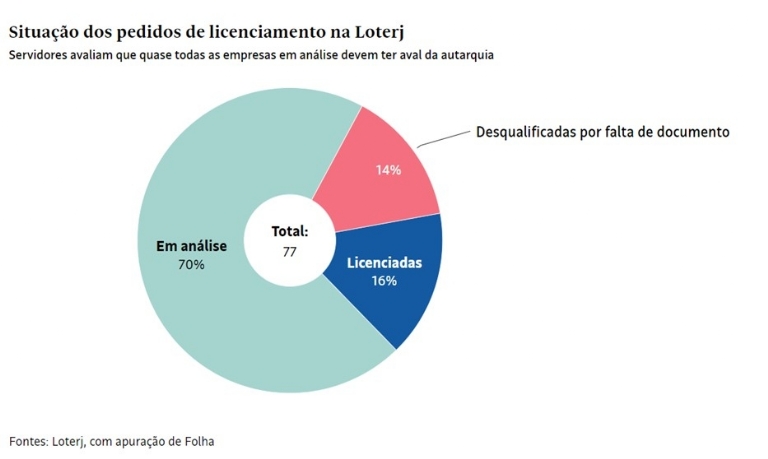The discussions on the regulation of iGaming in Brazil have caused movements rarely seen in a new economic sector. The delay of the federal government in regulating the activity and the proactive action of Loterj has led the sector to seek, at a local level, their licenses to operate nationally. Today, nearly 80 companies are waiting for authorization in Rio de Janeiro, compared to 20 that were in line a month ago.
The government's attempt to accelerate the regulation process of the betting market has exposed gaps in the framework designed by Congress, with the endorsement of the Ministry of Finance. Even before the regulated market begins to actually operate, on the next January 1st, bets have already invalidated decisions of the Secretariat of Prizes and Bets through appeals in the states, in court, and by purchasing licensed companies.
The most clear consequence of this was the surge in license requests at the State Lottery of Rio de Janeiro (Loterj). Until September 17, when the government announced that it would block this month the sites that had not requested federal permission or held a state license, there were 20 bets waiting for approval in the state. The number rose to 77 last Friday (18).
The lottery of Rio de Janeiro moves to establish itself as a national alternative for licensing bets, under government contestation. The Attorney General's Office (AGU) went to court to limit Loterj's operation to the territory of Rio de Janeiro.
Loterj managed, on August 1st, to obtain a preliminary injunction in the Federal Court of the District of Columbia to operate throughout the country. On the 5th, the government managed to overturn the decision. However, the state agency says it continues to collect bets in Rio de Janeiro and, therefore, would be in a situation of regularity.
The outcome of the judicial dispute of the Union against Loterj and the betting companies, according to lawyers consulted by Folha, will define how the rules will actually work, chosen by the Treasury as the main tool in the attempt to combat money laundering, dependency, and abusive advertising linked to bets.
The AGU stated that it will only comment on the matter in the court records. In the documents, the agency cites a risk of predatory competition among the federal entities to receive the betting sites, in case the Union loses in the imbroglio against the state-owned company from Rio. In this scenario, the actors would have incentives to approve laws and ordinances more lenient with financial crimes to attract betting houses.
The state-owned company from Rio, for example, does not require certificates of "no record" from all those involved in the corporate network of the betting sites.
The government, on the other hand, demands documentation from all individuals linked to the controlling and controlled companies by the CNPJ that wishes to receive the grant. It also requests a detailed business plan, with financial projections and specific financial statements.
At an event organized by the Lide group, by João Doria, last Friday, the president of Loterj, Hazenclever Lopes Cançado, stated that Loterj already receives license requests from companies from various states and even from abroad. Therefore, it will fight to ensure that the licensed ones serve players from all over the country, collecting the bets in Rio de Janeiro.
"It's the same logic as ecommerces, where the tax collection occurs in the state of the merchant", said Cançado to Folha. The license of the state agency from Rio would have global validity, as occurs with the authorizations from Malta, Curaçao, and Anjouan, adopted, in Europe, for example, to escape national regulations.
The federal government, on the other hand, says that the law requires, to avoid money laundering, a system of georeferencing the origin of the bet. This technology, adopted in Paraná and Maranhão, would allow restricting the operation of the licensed bets in the states to their respective territories, as defined by law no. 14.790 of 2023.
Cançado counters that the Supreme Federal Court (STF), when judging three actions, guaranteed the states the right to compete with the Union, even in the regulatory scope. For him, the government's action against the state agency aims to concentrate the collection of bets, continuing the history of monopoly of games by Caixa Econômica Federal.
In the sector, however, the assessment prevails that there is a difference in approach between the Treasury and Loterj.
Entrepreneurs in the field assess that of the more than 200 companies that requested permission to operate with bets, one or two dozen should withstand the federal rules and competition in the long run.
The lottery from Rio, on the other hand, should license more than 50 companies, operating in a less complex scenario and more inclined to leave criminal issues under the care of the police. Employees of Loterj themselves say, privately, that the guidance from superiors is to approve the requests, as long as minimum requirements are met —11 companies so far have failed for not being able to deliver the required paperwork and 12 already have permission.
The Treasury says that the issuance of authorizations and subsequent supervision in each state is the responsibility of the local authority.
In a third front of judicial conflict for the Union, various sectors of the economy try to invalidate, in an action at the STF, the law that regulated the betting market. This, in itself, would not throw the bets into illegality.
The AGU warned, in a petition addressed to the minister responsible for the case, Luiz Fux, about the risk of Brazil continuing as the headquarters of the current grey market of bets, if the STF accepts the request from the National Confederation of Commerce of Goods, Services, and Tourism to invalidate the regulation.
The correct thing, says the institution, would be to invalidate the law sanctioned by Michel Temer that freed the betting platforms at the end of 2018.
Source: Folha










